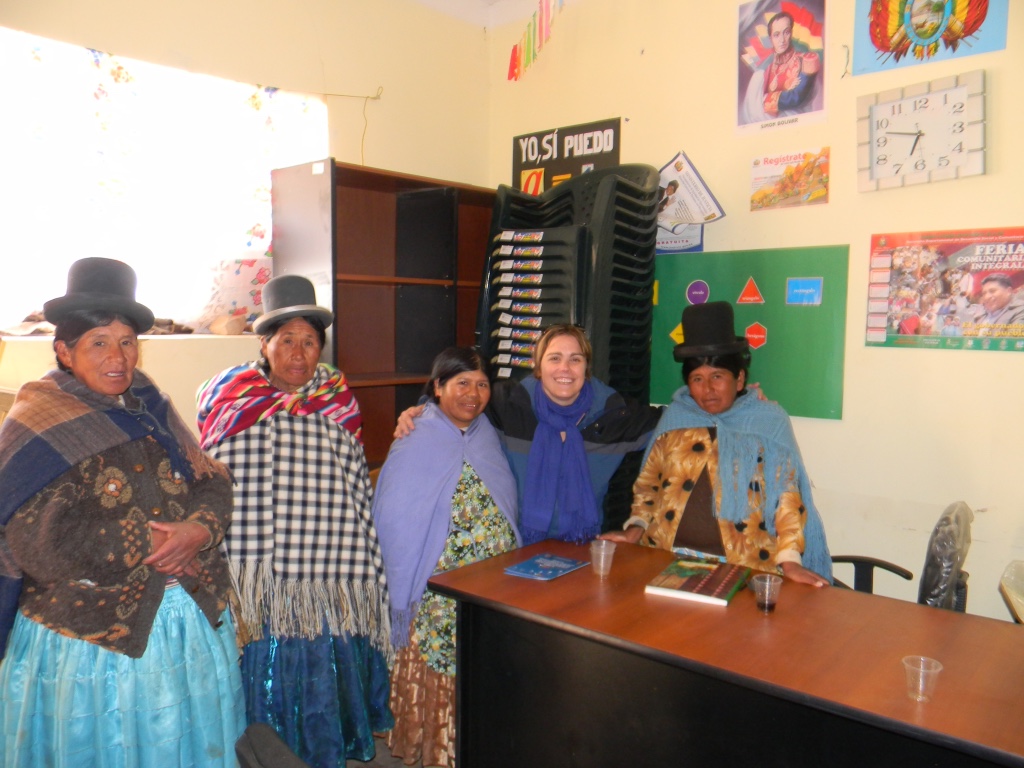F&M Stories
Professor to Study How Cities Are Reshaping Democracy
Over the years, Stephanie McNulty has conducted research on some South American, African and European countries where democracy is always a work in progress.
Having published widely on the subject, including two books – “Participatory Budgeting in Global Perspective” (2021) and “Democracy from Above?” (2019) – the Franklin & Marshall professor of government has recently won a National Science Foundation grant to continue her work.
McNulty is receiving $200,000, part of a $1.4 million award, shared across four continents by 25 researchers at 21 universities and colleges in seven cities—Buenos Aires, Cape Town, Lyon, New York City, Sao Paulo, Toronto and Warsaw.
This international research initiative will study how organizers in these cities reshape new tools in order to invigorate participation in democratic governance.

Professor McNulty with Bolivian participants working on participatory democracy. (Credit: Stephanie McNulty)
For the next three years, Par-City, the initiative that McNulty is leading with three researchers, will study New York City’s participatory institutions including the People’s Money, the Civic Engagement Commission and the grassroots efforts of organizations like the People’s Plan.
Their objectives are to find whether cities are responding to the global challenges of democracy, governance and trust; examine whether digital media, technologies and tools meet or fail these challenges; and advance concepts, models and theories of democracy, governance and trust.
We asked McNulty three questions about her research and this project:
Is this grant initiative an extension of your research and books on participatory democracy?
It is. I'm very excited because this particular grant is an international mechanism that brings together seven national funding agencies that pledged $200,000 each over three years to work on intransigent problems around democracy, government and trust. Combined, the $1.4 million funds seven teams researching participatory innovations in seven cities. With the exception of Lyon in France, all of them are “mega cities.”
What will your work entail and will you have students involved?
I'm the principal investigator for a team of four researchers, including me. We will research New York City's urban participatory landscape. We're going to look at housing, at the People's Plan -- a grassroots plan to try and engage citizens more actively in politics, participatory budgeting and at what's happening around immigration. I'm hoping to work with two Hackman scholars each summer, and my colleagues in New York will have graduate students as research assistants. I think F&M will be the only one with undergraduate students.
What are you seeking to accomplish with this work?
Our effort is to research the effectiveness of these participatory institutions in urban settings – the term is urban participatory institutions or UPI – to see how or if they are able to tackle issues like persistent inequality, climate change and the marginalization of certain populations. The big picture of this grant is a seven-country team doing this over three years. That's super exciting because honestly, in the participatory democracy world, as far as I know, that's never been funded by major agencies.
Related Articles
April 14, 2025
From Abstract to Applied: Physics Major's Hands-On Research Journey
For Youssef El Gharably ’25, his ideas may start in the classroom, but they can’t be contained there. At F&M, he made hands-on learning the cornerstone of his educational experience by conducting cutting-edge research alongside his physics professors.
April 10, 2025
Global Grad: Fatimata Ly '25 Pursues Diverse Academic Disciplines
Fatimata Ly’s studies took her to Tunisia and Italy and deepened her passion for international affairs. “Take full advantage of your liberal arts education, explore disciplines you’re unfamiliar with and step outside your comfort zone,” she said.
April 7, 2025
F&M Earns New Carnegie Research Classification
A new Carnegie designation ranks F&M among leading national institutions that prioritize research activity. Only 40 liberal arts colleges in the country have this distinction.
